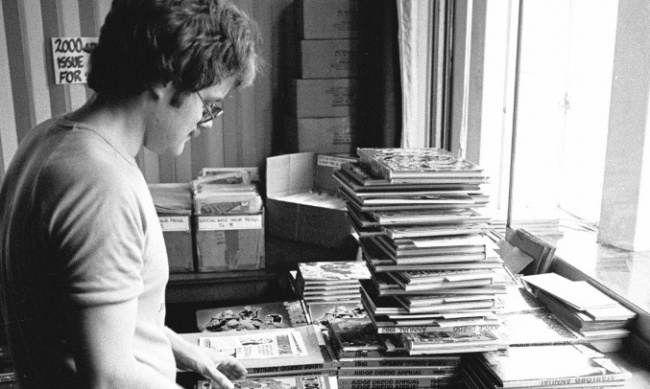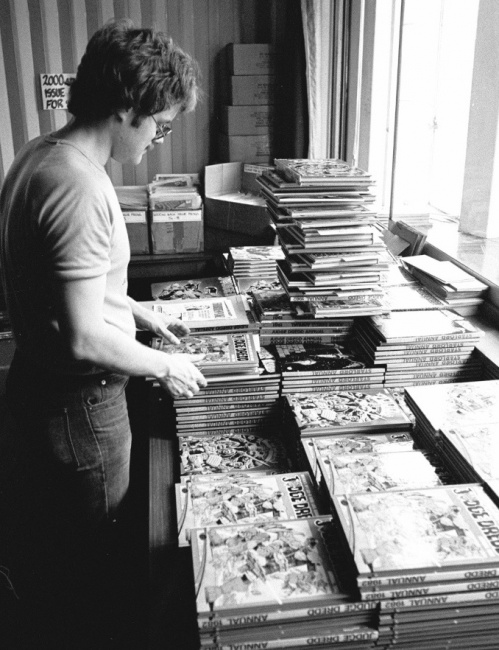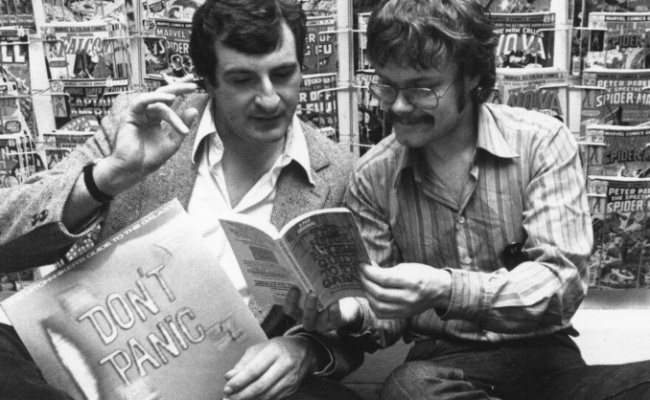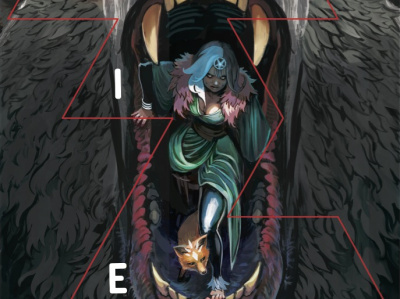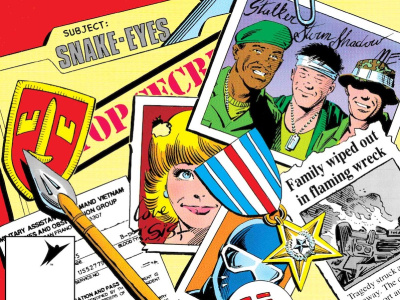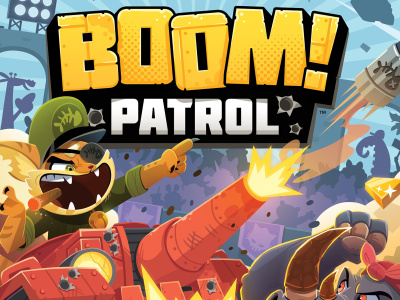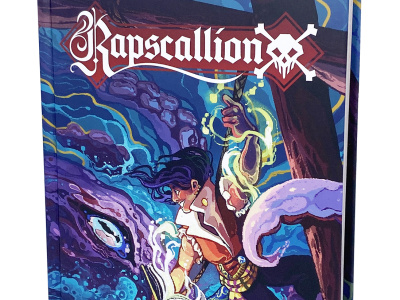For ICv2’s Comics Direct Market 50th Anniversary celebration, former retailer and DC Senior Vice President—Sales and Marketing Bob Wayne (see "ICv2 Interview: Bob Wayne") talks to Landau about his years in the business. In Part 3, Landau discusses the shift to graphic novels, the sale of the distribution company to Diamond and the formation of the current company, as well as his part in the stage production of Thunderbolts: FAB. In Part 1, Landau talks about starting the Comics Media fanzine and his own distribution company. And in Part 2 covers his time at the publisher IPC, where he edited 2000AD, and the opening of the first Forbidden Planet store in 1978.
This interview was conducted as part of ICv2’s Comics Direct Market 50th Anniversary celebration; for more, see "Comics Direct Market 50th Anniversary."
To watch a video of this interview, see "ICv2 Video Interview – Nick Landau, Part 3."
Bob Wayne: You were an early proponent of collecting comic book stories into book form and making graphic novels before they were being called graphic novels, to some extent. That seemed to me that it coincided with the rise of the format and the expansion of your distribution efforts. I suspect it also tied in with the time you had spent working at IPC on 2000AD and Judge Dredd that led you to having an inside track to be the book format publisher for Judge Dredd and the related characters. Am I correct on that?
Nick Landau: Yeah. Basically, I had so much spare time on my hands because in 1981, we were only opening a second store plus a New York store. I thought that this was about the time we should get into publishing.
I approached IPC. Having been a big fan of the "bandes dessinée," the French comic strips, I thought, "They're putting these albums out, and I think they're pretty awesome." I wasn't that familiar; ironically, I hadn't really followed the American model, I'd followed the French model.
I went to IPC and I said, "I'd like to collect 2000AD material into book form," and negotiated a deal with John Sanders, the same guy who'd interviewed me when I first came to 2000AD, and arranged a deal with him whereby we could actually reprint Judge Dredd and other strips from 2000 AD.
The only problem at the time was I had absolutely no idea how to print or publish a book, which never really stopped us from doing anything. Mike actually had a lot of faith in the prospects, and the rest of the staff thought I was going to bankrupt them. I remember them coming up to me and wondering whether I was going to put all our money into doing this crazy notion of a publishing company.
Anyway. I figured out how to print a book. We laid out the first book, which was all Brian Bolland because it seemed like the right thing to do. Commissioned the cover from Brian, and a back cover. Laid it out on his kitchen table because I'm not sure I actually had a drawing board in the office, and then sent it to the printers.
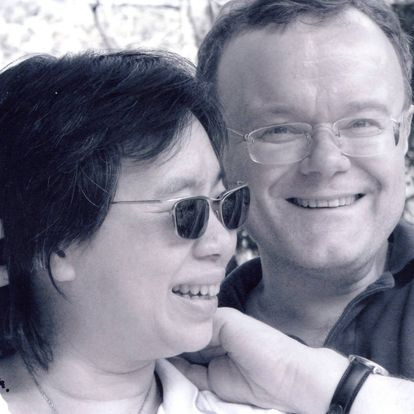
Image: Photo © Francesca Ruxton
Forbidden Planet co-owners Vivian Cheung and Nick Landau, about 2010.
I think that book reprinted something like 20 times over the course of its life, but it just led to a lot more publishing. Eventually the library of 2000AD books, I think, ran to about 80 books. We created material for each character. Each character had their own series. I think Judge Dredd itself ran to about some 30 or 40 volumes. Then all the other characters had a pile of volumes as well. That was basically the beginning of that publishing.
Then the next stage of this was (actually, in 1985, it started, but the event didn't happen until '86) where DC had published Dark Knight Returns. I thought this would be, and again, I think Mike was pretty instrumental in this, thought this would be a good idea if we published the UK edition of Dark Knight Returns when it was collected. I'd heard rumors that it was going to become a graphic novel. [I] approached DC Comics. I don't think that my old friend, Paul Levitz, was yet in a position of power there. I remember talking with Jenette Kahn and the foreign rights team, and them being vaguely interested in the idea of us being the UK publisher, but nothing seemed to be happening.
We're getting closer and closer to what I knew to be the deadline, the print time that the book was going to press, and Jenette Kahn had disappeared. She was the only one who could make the decision. I found out that she'd gone to a hotel in the UK. I rang the hotel and had a chat with her. She wasn't really sure. Then I rang Frank, Frank Miller, who's a good friend, and said to Frank, "Could you please express your interest, if you are interested in us being the UK publisher?" Frank was very enthusiastic to support us. He rang Jenette, and Jenette actually said, "Yeah, OK. If Frank wants this, we'll do this deal with you." Really thanks to Frank, we became the UK publisher of the first collection, which then led on to Killing Joke, Batman: Year One, Watchmen, of course. We basically became DC's publisher for the next 30 years.
What had happened was that in the meantime, after those four or five first seminal books came out, we had started to get a lot of publicity in the UK. We had a market that was saying, "We like graphic novels now." We'd done a lot of publicity through the newspapers. We'd done a lot of press. We had done a lot of media through TV, and we'd created a buzz.
I remember contacting DC and saying, "What's the next book? What have you got? Watchmen's out, we now need to do something else." They said, "Actually, I'm not sure we've got anything planned." I came up with the idea of starting our own collections. We took Alan Moore's Swamp Thing and started doing black and white editions of Alan's work. For each one of those books, we had a horror writer write the introduction. Clive Barker did one, I think Ramsey Campbell did another. That got us the media attention that we needed, because at the time, people didn't know who this guy [was]; well, they did know through Watchmen, but they needed an extra nudge because it wasn't Watchmen 2. We started getting a lot of publicity from that.
Then a few years later, DC sort of looked and said, "Actually, Titan's done these collections, might be time that we did them in the States as well." By that time we had done the Alan Moore/Dave Gibbons Superman book. Most of Alan's work we'd collected in black and white form. Then DC came on board and decided to do color editions as well.
It was weird that we had this slight reverse influence on what was going on in the States. It wasn't intended. We were basically trying to fulfill a demand that was there.
You helped to tilt the marketplace to graphic novels being a dominant form instead of being entirely periodical focused.
Absolutely. We were very, very early adopters of getting graphic novels into bookstores. I remember when DC was doing the same thing in the States, we used to sit down with the folks up at DC and just compare notes about progress within the bookstore chains and obviously the comic store chains. It was a very exciting, vibrant time.
While it would have seemed that you had plenty on your plate, take just a minute to explain how you got involved in a Thunderbirds live action presentation in the West End.
That was a little bit accidental. Again, going back to my earlier desire, because I'd always had this dichotomy between, was I going to go and make movies or was I (that was a pretty pretentious thought), but was I going to go and make movies or was I going to go into comics or was I going to do something else?
I met this this guy called John Gore, who'd come out of one of the student theater groups where you learn theater. He was putting on this production which was a Batman play, which I think he had properly licensed through Warner Brothers in an informal way. I saw it and I thought, this is fantastic. I met him backstage afterwards and I said, "John, we got to work together. I don't know what we're going to do, but we're going to have to work together because we should make some movies together." For the next year or so, we noodled around in terms of the sort of ideas that we could do.
He had found this, I guess equivalent to an Off‑Broadway production of Thunderbirds: FAB, which was basically a Mime Theater production featuring the characters of Gerry Anderson, who was one of the great children's science fiction puppeteers of the '60s and created these great shows like Thunderbirds and Captain Scarlet and later went on to live action with Space: 1999 and a whole pile of other things. He was basically one of the forerunners of children's TV during the 60s and also produced some great comic books too. There was a comic called TV 21 that came out of the Thunderbirds show.
Anyway, so back to Thunderbirds. John and I thought, maybe we can do something here in terms of giving this production a bigger platform. I'd known Gerry Anderson for many years, so I put John in touch with Gerry and they cut a deal to do a production. We ended up buying, and this is something that I learned later that you never should do, you should have these things called angels. Angels are people who invest in theater productions. You don't put your own money in, but that was the mistake we made.
We invested in this theater production in the West End, the Gielgud theater. I think it was rebranded quite literally the day we put our first production on. We booked five weeks in the theater, because we thought, we couldn't even afford the sixth week [laughs] and if things went belly up, we'd be in deep trouble. We put the production on, and I remember that first evening, we had the owners of Stoll Moss Theatres who were the equivalent of the Lloyd Webbers, who owned a pile of theaters in Central London. The owners came along to John and myself, and to Mike, Mike Lake, of course, they came along to the three of us and said, "Wow, this is something a bit different." We were a little bit worried by that comment, weren't quite sure what they meant by that. He said, "You seem to have brought a rock audience into our theaters." We thought for a moment that was a bad thing, or we weren't sure how they were going to play it. They were used to 50 plus Americans mostly, who would come in, come to the Shaftesbury Avenue, see all the productions and go home. They had never seen a music crowd turn up at one of their theaters. It was an audience full of leather jackets, black leather jackets, and it was a sold out first night. They actually had come to say, "This is so bizarre, we've never seen anything like this before, and well done." [laughs]
Then we ran for five weeks, booked out every single night, got rave reviews. We also had the cheapest production in town. We had two actors. We had no script because it was a mime theater. Well, we had a script, but there were no words, [laughs] so no one said anything. Our set consisted of a screen behind, it was just a green screen, and two pairs of hands. Literally, if I put my hands up like this, if you're familiar with Thunderbirds, you know that sequence where Thunderbird 1 comes out of the swimming pool? The hands, and I am not any good at doing this but I'll give it a go. [demonstrates with hands] Basically, you'd see Thunderbird 1 coming out, and these were the flames of Thunderbird 1, like this, as the ship goes up, and then the palm trees would open. You'd put tiny little palm trees on the end of the fingers and it would open out like this. That was our set. These two guys, Gavin and Andrew, playing all the roles, all the productions. Normally, you’re supposed, by union rules, to have an orchestra. We managed to get around that, and we had a boombox. Literally, this was a cut‑price production, but it worked because it was so different from anything else that was going on in the West End.
We then ran out our five‑week period. We renewed, "Hey, let's go for another five weeks," because maybe that was just a coincidence that we sold out every night for five weeks. We sold out for another five weeks. We, again, did all these things that were wrong. We should have had a long‑term contract. If we'd had angels, we would have made a real decent living out of this, but we kept doing these short runs.
Eventually, we learned. We ran for five years in the West End. We started touring around the world. Weirdly, to this day, because we would bring the show back over the years, to this day, Thunderbirds: FAB holds the records in the London West End for the most revivals. We've had six revivals of Thunderbirds. No other play, apparently, in the history of London theater has had six revivals. We hold that record. That was Titan Productions.
John Gore has gone onto the States. He's now a big proprietor in America, and his ex‑partner. He's recently bought Hammer Films. I think he's going to do some very exciting things there. He's in theater production, he's in movie production, etc. A very lovely and charming man.
That's the history of Titan Productions. We did that one production for five years and then we decided that really, we would probably stay as retailers, distributors, publishers, and merchandising, and that theater production was probably one business too many. [laughs]
We'll fast forward a little bit. Speaking of the distribution company, Titan Distributors, I believe, came to an end around 1993 when collectively, you sold to Diamond Comic Distributors, and it eventually became rebranded as Diamond UK. Is that when the original Titan structure dissolved? Do I have the timeline correct on that?
Yeah. It was probably around '91, '92 that—and this may surprise you—that I think the team was beginning to feel a bit burnt out by all these things that had been going on.
You don't say? [laughs]
Both Mikes effectively turned around one day and said, "Well, we'd kind of like to retire." [laughs] I said, "I actually don't want to retire. [laughs] I think we're only just beginning." That was really the genesis of what happened.
We figured the only real way of moving things forward was to sell the distribution business, and then my wife Vivian Cheung and I set up a business called the Titan Entertainment Group. We brought in under Titan most of the Forbidden Planets and also the Titan Publishing Group, and Diamond got the distribution business.
It was getting a little bit tough at that stage to run the distribution business because sometimes you can have too many parts of the business. We were getting customers who were going, "Oh, you're doing all this for Forbidden Planet as Titan Distributors." It seemed like it was actually a good solution.
Steve came over, Steve Geppi, and we spent a lot of time figuring out with him and Chuck Parker how to sell the business to them. That was consummated in '93. Titan Entertainment Group was set up the day after.
Titan Entertainment Group then is basically 30 years old this year?
It is.
{IMAGE_3}Congratulations to you and Vivian on keeping that going for 30 years plus, and apparently, still speaking to each other. [laughs]
I know. It's supposed to be a difficult balancing act, husband and wife running a business together, but she's brought a lot of sensible, practical ideas for the business. I think we had our rock star phase, the wild children that we were up until '93, running every which way, and then in '93, I think we became the much more sensible corporation courtesy of Vivian.
I don't disagree with you on that. Some of the times you and I met, we would start off talking about things that we had done from when we first met in 1979 till that day, and she would just sit there and nod. You could just tell she's thinking, "As soon as you boys stop this conversation, we can actually talk business."
[laughs] Yes. She's a very practical person. She brings a lot of order to the potential chaos we can cause.
You're still in retail, you're still in publishing, you've got Titan books. Behind you, I see media books and prose fiction and comics and graphic novel stuff. You do some manga, you do some merchandise. I think you do some magazine publishing. It seems that you probably still have enough going on to stay busy.
Yeah. It keeps us on our toes a bit. One of the things that we're very proud of is the growth of the fiction division. We've set up a lot of new publishing programs. We're very pleased to be working with, for years now actually, probably celebrating our 10th or more anniversary of working on Hard Case Crime with Charles Ardai. Publishing people like Stephen King, which is not something we were expecting when we started a fiction publishing program.
Having worked in the movie industry for a long time on the film and TV books that we do, the TV industry, the gaming industry, which of course, then rolls into Titan Comics as well, and more recently, Titan Manga, although we actually started publishing manga back in the '90s. The first publications that we had were properties like Akira and Ghost in the Shell. Then Kodansha came along and decided that they would set up their own business in America, so we had to backtrack a bit on manga publishing. But I think we're celebrating 30 years of manga publishing almost. It's like revisiting an old friend. [laughs]
Still, the wellspring of all this wouldn't have happened without comics, without comic book stores, without the growth of the Direct Market, without your working with Phil and Jonni on Sea Gate and stuff. It's just a fascinating evolution of how you can start at one point and still hold that as a central thing, but then do all these other things in addition to it.
A series of fortunate coincidences. You start something, and then you realize there's an opportunity to do something else. As we grow, the opportunities grow bigger. We started out as a UK publishing business and now we're a global publishing business. We started out with one small store, and now we're a chain of stores.
Every time we face a challenge, we try to come up with a solution. We had to, during the pandemic, close all our stores. We thought that 2020 was going to be a terrible year. We wanted to find a way of communicating with our consumers, so we came up with this idea of Forbidden Planet television. That came out of a celebration that we did. Andrew Sumner, who you know very well, has helped us achieve that ambition as the host of TV, and is now working very closely with us on the retail side.
What happened was that after we closed, we were feeling a bit under the weather. We thought, "Well, how do we go out and talk to people?" We came up with this idea of FP42. There's a reason for the 42, as you would know, is that it's the Douglas Adams' Secret of the Universe.
Douglas did an early signing for you, if I remember.
Douglas did about 30 early signings.
I meant, I think he did a Denmark Street signing, didn't he?
He did. He did about 15 Denmark Street signings. In fact, at the beginning of one of his autobiographies, there's six pages dedicated to the Forbidden Planet signing that he did. Love Douglas to bits, he was a wonderful human being, and he was an inveterate exaggerator. Quite literally, he described it as being the largest signing that anyone had ever had in the whole of humanity. That was how he would describe it. Things were always bigger, larger than life.
He ended up holding the record for the number of signings at Forbidden Planet. I think latterly, Terry Pratchett beat that record. I think people like Mike Moorcock are now getting close to it. We've got a lot of classic creators who have passed through the doors of Forbidden Planet.
A lot of filming goes on in the UK. I remember one time, and I'm obviously diverting from your question here, but I remember one time in the Shaftesbury Avenue store, which is the third iteration, the big one now, 10,000 square feet, Johnny Depp walks in. Johnny actually is a customer of ours, but he had just come from an international presentation that he'd been giving to foreign cinema distributors. He walked in in full Captain Jack regalia. He was wearing the costume. Captain Jack walks into Forbidden Planet and basically does his shopping. Pretty much any other store, he would have been besieged because they'd have gone, "Johnny Depp, what's going on here?" but they thought he was a cosplay guy. He walked around just in costume, completely undisturbed, went up to the till, bought his stuff, and left again.
We don't get many actors or directors coming in in their costumes, but we do get an awful lot because of the filming that's going on. You can quite often come into the store and you'll see a famous director, the genre director or actor or something.
Recently, we had a signing for Avatar, the Jim Cameron movie. I think we had the world's only cast signing. That was at Christmas, just before the film came out. We had the producer come along, we had the cast come along. I was talking to some of the members of the cast, and one of the actors, Jack Champion was his name, very lovely guy, very nice guy, when I came up to him, he said, "This is quite a different experience for me." I said, "Why is that?" He said, "Well, two years ago, I was in the Forbidden Planet queue. I was the customer getting things signed from someone else. This time, I'm now one of the actors in the movie."
There's been a whole evolutionary process of fans who have become actors, who are then on the other side of the table, so to speak. Early customers are people like Henry Cavill, Superman, John Boyega from Star Wars, these are all customers of Forbidden Planet. It's been very interesting to see this interplay going on as well. Many of them are just fans of the genre and have grown up being a Forbidden Planet customer and are now doing their thing in movies or TV or gaming or music or whatever.
Forbidden Planet has been a part of their life their entire adult life.
Indeed. I remember Norm Jacobs at Starlog saying the same thing years ago. He said that one of his young readers was a guy called Steven Spielberg and by reading Starlog was influenced to go into movies and start directing.
I think we've followed that same trajectory with Forbidden Planet, where the kids are surrounded by the stuff they love. It fuels their interests, and then they actually go off and become part of the industry. That can be comic book creators, happens all the time with comic book creators, of course, which is brilliant, but it also happens in these other fields too.
Agreed. Thank you for your time, Nick. We look forward to chatting with you again in the future.
Thank you, Bob. It's been very interesting. It's probably been 40 or 50 years since I even thought about a lot of these things. [laughs]



